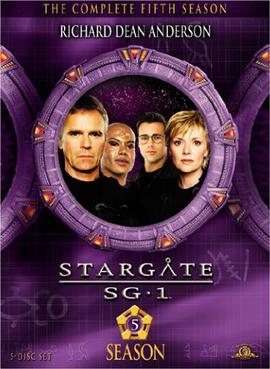Related Research Articles

Daniel Jackson, PhD, is a fictional character in the military science fiction franchise Stargate, and one of the main characters of the 1997 series Stargate SG-1. He is portrayed by James Spader in the 1994 film Stargate, and by Michael Shanks in Stargate SG-1 and other SG-1 derived media. Jackson is the only Stargate character to appear in all films and series in the franchise.
Lieutenant General George S. Hammond, USAF (Ret.) is a fictional character in the Stargate franchise. Played by American actor Don S. Davis, General Hammond serves as the commander of Stargate Command (SGC) in the first seven seasons of the 1997 television series Stargate SG-1. He is relieved of command in the series' season 7 finale "Lost City", but becomes head of the new Homeworld Security department at the beginning of season 8. Hammond's off-screen retirement is confirmed in SG-1's season 10, and the character's death is mentioned in the series finale of SG-1's spin-off series Stargate Atlantis, "Enemy at the Gate".

"Wormhole X-Treme!" is the 100th episode of military science fiction adventure television show Stargate SG-1 and is the 12th episode of the fifth season. The episode was first broadcast September 8, 2001 on Showtime in the United States. It was written by series co-creator and executive producer Brad Wright along with supervising producers Joseph Mallozzi and Paul Mullie and was directed by Peter DeLuise.

Jonas Quinn is a fictional character in the Canadian-American television series Stargate SG-1, a science fiction show about a military team exploring the galaxy via a network of alien transportation devices. Played by Corin Nemec, Jonas is introduced in the season 5 episode "Meridian." Jonas fills Daniel Jackson's empty spot on the SG-1 team in season 6 and the beginning of season 7, and last appears in the mid-season 7 episode "Fallout".

Colonel Cameron "Cam" Mitchell, USAF is a fictional character in the 1997 American military science fiction television series Stargate SG-1, a science fiction show about a military team exploring the galaxy via a network of alien transportation devices. Played by Ben Browder, Cameron Mitchell is introduced as a main character in the season 9 premiere "Avalon", holding the military rank of lieutenant colonel in the United States Air Force. Learning of the SG-1 team's off-screen separation after the previous season, Mitchell is assigned as new commanding officer of SG-1, which he remains throughout season 10 (2006–2007) and the direct-to-DVD films Stargate: The Ark of Truth, ending at the rank of colonel for Stargate: Continuum (2008).
"Moebius" is the two-part season finale for season eight of the Canadian-American military science fiction television series Stargate SG-1. The episodes were written by Joseph Mallozzi, Paul Mullie, Executive producers Brad Wright and Robert C. Cooper, the episodes were directed by Peter DeLuise. The episodes were the strongest episodes in the eighth season on the Nielsen household ratings with fellow Stargate SG-1 episode "New Order". The episode got strong reviews from major media publishers worldwide.
"Redemption" is the two-part season 6 premiere of the science fiction television series Stargate SG-1. Airing on June 7 and June 14, 2002, it was the first all-new SG-1 episode to be broadcast by SCI FI, the new home of SG-1 after the series' move from Showtime. The episode was written by producer Robert C. Cooper, and directed by Martin Wood. "Redemption" is the first episode where actor Corin Nemec had main cast status, his character Jonas Quinn replacing Daniel Jackson who died at the end of season 5. The episode also marks the second appearance of David Hewlett's character Rodney McKay, who later became a main character on Stargate Atlantis. "Redemption Part 2" was nominated for a Gemini Award in the category "Best Visual Effects".
"Lockdown" is the third episode for season eight of the Canadian-American military science fiction television series Stargate SG-1. The episode was written by Joseph Mallozzi and Paul Mullie, and directed by Will Waring. This was the only episode in the eighth season to receive a syndication rating, but was also one of the lowest rated of the season on the Nielsen household ratings. The episode got strong reviews from major media publishers worldwide.
"Chimera" is the 15th episode from the seventh season of military science fiction adventure television show Stargate SG-1 and is the 147th overall. It was first broadcast on January 20, 2004, on Sky One in the United Kingdom. The episode was written by the shows executive producer Robert C. Cooper, with Damian Kindler writing the teleplay and Will Waring directing.
"Avenger 2.0" is the 9th episode from the seventh season of military science fiction adventure television show Stargate SG-1 and is the 141st overall. It was first broadcast on August 8, 2003, on the Sci-Fi Channel. The episode was written by duo Joseph Mallozzi and Paul Mullie, and was directed by Martin Wood.
"Enemy Mine" is the 7th episode from the seventh season of military science fiction adventure television show Stargate SG-1 and is the 139th overall. It was first broadcast on July 25, 2003, on the Sci-fi Channel. The episode was written and directed by Peter DeLuise.
"Revisions" is the 5th episode from the seventh season of the science fiction television series Stargate SG-1 and is the 137th episode overall. It was first broadcast on the Sci-Fi Channel on July 11, 2003. The episode was written by Joseph Mallozzi and Paul Mullie and was directed by Martin Wood.
"Orpheus" is the 4th episode from the seventh season of military science fiction adventure television show Stargate SG-1 and is the 136th overall. It was first broadcast on June 27, 2003, on the Sci-Fi Channel. The episode was written and directed by Peter DeLuise.
"Fragile Balance" is the 3rd episode from the seventh season of military science fiction television show Stargate SG-1 and is the 135th overall. It was first broadcast on June 20, 2003 on the Sci-fi Channel. The episode was written by Peter DeLuise and Michael Greenburg, with Damian Kindler writing the teleplay. DeLuise also directed the episode.
"Homecoming" is the 2nd episode of the seventh season of adventure military science fiction television series Stargate SG-1. The second part of a two-part episode, it was first broadcast on June 13, 2003, on the Sci-Fi Channel, directly after the part 1, "Fallen". Writing duo Paul Mullie and Joseph Mallozzi wrote the episode, with Martin Wood directing. The episode is the 134th overall.
"Full Circle" is the season finale for season six of the Canadian-American military science fiction television series Stargate SG-1. It was originally intended to be the last episode of Stargate SG-1. The episode was written by executive producer Robert C. Cooper and directed by Martin Wood. The episodes received an average Nielsen household rating and a low syndication rating compared to other season six episodes. The episode got strong reviews from major media publishers worldwide.

"Small Victories" is the first episode from season four of the science fiction television series Stargate SG-1. Penned by Robert C. Cooper and directed by Martin Wood, the episode first aired on the American subscription channel Showtime on June 30, 2000. "Small Victories" resumes the story of the season 3 finale, "Nemesis", in which the SG-1 team encountered the Replicators for the first time. As the Replicators threaten Earth and the Asgard home galaxy, the team must split to master their job.

The eighth season of Stargate SG-1, an American-Canadian military science fiction television series, began airing on July 9, 2004, on the Sci Fi channel. The eighth season concluded on February 22, 2005, after 20 episodes on British Sky One, which overtook the Sci Fi Channel in mid-season. This was the first season of the show to have 20 episodes instead of 22, as well as the first to air concurrently with Stargate SG-1 spinoff series Stargate Atlantis. The series was originally developed by Brad Wright and Jonathan Glassner, while Brad Wright and Robert C. Cooper served as executive producers. Season eight regular cast members include Richard Dean Anderson, Amanda Tapping, Christopher Judge, and Michael Shanks

The fifth season of the military science fiction television series Stargate SG-1 commenced airing on Showtime in the United States on June 29, 2001, concluded on Sky1 in the United Kingdom on February 6, 2002, and contained 22 episodes. The fifth season introduces future main character Jonas Quinn portrayed by Corin Nemec from 2002–2004. The fifth season is about the ongoing war with the Goa'uld Empire after the death of Apophis at the start of the season and the rise of a new System Lord named Anubis. SG-1, a military-science team, are set to explore the Milky Way Galaxy.
References
- 1 2 3 4 5 6 7 8 9 DeLuise, Peter (2001). Audio Commentary for "Window of Opportunity" (DVD – Stargate SG-1: Season 4). MGM Home Entertainment.
- ↑ "Joseph Mallozzi chat transcript". GateWorld. November 19, 2000. Archived from the original on March 1, 2009. Retrieved February 1, 2008.
- ↑ "Interviews: Joseph Mallozzi". GateWorld. May 2006. Archived from the original on 2009-03-01. Retrieved 2008-02-01.
- 1 2 Gibson, Thomasina (2002). Stargate SG-1: The Illustrated Companion Seasons 3 and 4 . Titan Books. ISBN 1-84023-355-9.
- ↑ Mallozzi, Joseph (December 8, 2007). "Thoughts and Tirades, Rants and Ruminations – December 8, 2007". josephmallozzi.wordpress.com. Retrieved 2008-02-01.
- ↑ Malikai: "I need more time. Once I've correctly deciphered the symbols on the altar I will be able to master the time device." / O'Neill: "Why, so you can be king of Groundhog Day?"
- 1 2 3 4 5 6 James Tichenor (2001). Audio Commentary for "Window of Opportunity" (DVD – Stargate SG-1: Season 4). MGM Home Entertainment.
- ↑ Mullie, Paul (January 15, 2008). "January 15, 2009: Writer/Executive Producer/Notorious Recluse Paul Mullie Answers Your Questions!". josephmallozzi.wordpress.com. Retrieved 2009-01-16.
- ↑ "Gateworld.com, Window of Opportunity Episode Guide". Archived from the original on 2006-05-26. Retrieved 2006-05-13.
- 1 2 Wright, Brad (2001). "Secret Files of the SGC – The Stargate Universe" (DVD – Stargate SG-1: Season 3). MGM Home Entertainment.
- 1 2 Storm, Jo (2005). Approaching the Possible: The World of Stargate SG-1. Toronto, Canada: ECW Press. pp. 268–270. ISBN 1-55022-705-X.
- ↑ Mallozzi, Joseph (February 23, 2007). "Thoughts and Tirades, Rants and Ruminations – February 23, 2007". josephmallozzi.wordpress.com. Retrieved 2008-02-01.
- ↑ Heaton, Dan (October 21, 2003). "Stargate SG-1: Season 4". digitallyobsessed.com. Archived from the original on 2011-07-10. Retrieved 2008-02-01.
- ↑ Phelps, Dan. "Stargate SG-1: Season 4". dvdfanatic.com. Retrieved 2008-02-13.
- ↑ Hunt, Heather (2005). "Inside the Cover Book Reviews". absolutewrite.com. Archived from the original on 2007-11-27. Retrieved 2008-01-02.
- ↑ "Genré magazines interview SG-1 stars". GateWorld. February 6, 2001. Archived from the original on March 1, 2009. Retrieved February 1, 2008.
- ↑ Snow, Alli & Rieling, Sheryl R. (February 13, 2001). "Stargate SG-1: What About Season Four?". space.com. Archived from the original on 2009-03-01. Retrieved 2008-02-13.
- ↑ "Best episode ever". scifi.com. June 19, 2007. Archived from the original on December 14, 2007. Retrieved 2008-01-02.
- ↑ David, Greg (June 20, 2007). "Goodbye 'Stargate SG-1'". msn.ca. Archived from the original on June 24, 2007. Retrieved 2008-02-01.